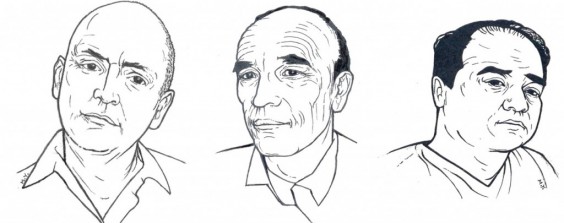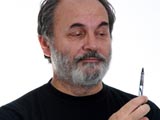A Month of Literary News and Defenders of Free Speech
by Tarık Günersel / October 24, 2014 / No comments
The 80th PEN International Congress took place in a month abundant with literary news.

The PEN Congress honored three imprisoned writers. Photo provided by author.
For this month’s column, Tarik Günersel created his own Freedom of Speech roundup, covering the end of September through mid-October. It’s been a time of conferences and congresses, and how could he leave out the Nobel Peace Prize and the latest ISIS attack in Kobane?

- Life is words in action, literature is action in words.
- Humans are about to destroy their spaceship Earth. Some of them are aware of this and they try to change the course of events. Will they succeed? Will more humans be alarmed and do something?
- Literature is vital and translators are messengers of world peace.
- Though I shall focus on the literary scene in Turkey and its problems regarding freedom of expression, I shall not omit the other parts of our planet. Today local is global and vice versa.

- Tarık Günersel is a poet, playwright, aphorist, librettist and short story writer. He is the president of PEN Turkey and an ex-member of the PEN International Board. He studied English Literature at Istanbul University. A self-exile after the military coup in 1980, he spent four years in Saudi Arabia with his wife Füsun and their daughter Barış, teaching English. A dramaturg at Istanbul City Theater since 1991, he has acted on stage and screen and directed some of his plays. He proposed World Poetry Day in 1997 which was accepted by PEN International and declared by UNESCO as the 21st of March. His translations into Turkish include works by Samuel Beckett, Vaclav Havel and Arthur Miller. His works include The Nightmare of a Labyrinth (mosaic of poems and stories), and How’s your slavery goin’? His Oluşmak (To Become), a “life guide for myself,” includes ideas from world wisdom of the past four millennia. He has recently initiated the Earth Civilization Project with the support of several intellectuals from various parts of the planet.
The 80th PEN International Congress
The 80th Congress of PEN International took place in Bishkek, the capital of Kyrgyzstan, from September 29 to October 2, 2014. The Central Asian PEN Centre hosted the event.
“My language, my story, my freedom,” was the theme of this year’s Congress. PEN International President John Ralston Saul thanked Central Asian PEN, whose President, Dalmira Tilepbergenova, played a leading role in organizing the event. International President Saul, International Secretary Hori Takeaki, International Treasurer Jarkko Tontti, International Board Member Marketa Hajkelova, Executive Director Carles Torner, and the London PEN Office team worked together throughout the preparation period and the congress.
Opening Speech by PEN International President, John Ralston Saul, September 29th, 2014
This is the first time that PEN International has come together, in all of its variety, in Central Asia. Two hundred and fifty writers, 80 PEN Centres, every continent, every kind of writing, so many languages. We will be meeting, debating, talking in public, going into schools, and much more, throughout the city of Bishkek. This is an unprecedented gathering in this part of the world.
Our presence here is, in and of itself, a demonstration of what literature represents and how freedom of expression works.
Writers from throughout the five central Asian countries are gathered together to talk among themselves and with the rest of us. We will focus ourselves on questions of translation, of writers rising above the Russian/Ukrainian conflict, of the unacceptable rise in anti-LGBTQI legislation which limits the freedom of expression of a part of the citizenry in different parts of the world, of languages at risk, of writers in prison and many other issues. As I said a moment ago, our very presence is a demonstration of how freedom of expression works. It is about bringing people together. It is not about everyone being the same or in agreement. It is about expressing our disagreements and developing a tick enough skin to limit those disagreements to words. We all learn through repeated experiences how the discomfort of free expression is tied to social restraint and respect for the differences of others. This is all about the true complexity of rich civilizations.
The welcome in Kyrgyzstan is already remarkable. It is an enormous commitment to organize a Congress. Central Asian PEN has proved that it can be done, and in a new and imaginative way.
One of the strengths of the literature in this region is that it has not lost its links with oral culture. We are seeing around the world an opening up to a new kind of oral culture because of the constant technological breakthroughs. I believe that this unbroken oral tradition in Central Asia carries lessons for all of us as the new oral phenomenon strengthens. Everywhere this may be one of the great lessons we all take away from the 80th Congress in Bishkek.
PEN Committees, Critiques and New PEN Centres
Meetings of the four PEN committees — Writers in Prison Committee, Translation and Linguistic Rights Committee, Women Writers Committee, and Writers for Peace Committee — accompanied literary activities.
China, Cuba, Eritrea, Iran, North Korea, Russia, Saudi Arabia and Turkey were among the most heavily criticized countries, due to the human rights abuses of their governments, including poor standards for freedom of expression.
According to an email I received from PEN International, the Assembly of Delegates approved the establishment of four new PEN Centres in Eritrea, Honduras, Liberia, and Wales. They also elected Teresa Cadete (Portuguese PEN President) and Margie Orford (Executive Vice President of South African PEN) to fill two of the ten seats on the International Board.
Empty Chairs for Askarov, Tohti and Kozlov
PEN International’s Assembly of Delegates called for the immediate and unconditional release of three writers imprisoned in Central Asia: Azimjon Askarov (also known as Azimjan Askarov) from Kyrgyzstan, Ilham Tohti from China and Vladimir Kozlov from Kazakhstan. According to PEN’s tradition, three chairs were left empty during the activities, in commemoration of the imprisoned writers.
PEN New Voices Award to Marina Babanskaya
Marina Babanskaya, born in 1986 in the Rostov region in southern Russia, holds a BA in Journalism from the Institute of Journalism and Creative Writing and a degree in Law. She is currently studying for an MA in Folklore and Mythology at the Russian State University for the Humanities and lives in Moscow. The St. Petersburg PEN chapter nominated her for the award.
PEN Ural Altay Solidarity Network
Following the International Congress, the PEN Ural Altay Solidarity Network Conference was held from the 3rd to the 5th of October on the beautiful Issyk Lake, where the Sky God Tengri embraces the Earth. Kaiser ÖzHun, the ex-President of Uyghur PEN, presided.
I could attend neither the Congress nor the Conference due to an expected and happy family event. I am grateful to my friends on the Turkish PEN Board who attended both: Zeynep Oral, Tülin Oral and Halil Ibrahim Özcan. They provided me with the necessary information for this column.
Defending Kobane Against ISIS
As you probably know by now, Kobane is a town in northern Syria, near the southern border of Turkey. Kurdish fighters have been trying to defend the town against ISIS attacks. In Turkey, not only the Kurds but also Turkish democrats express solidarity with the defense of Kobane. Naturally, more efforts will be necessary to secure the town.
The sectarian Sunni AKP government in Turkey insists that the overthrow of Bashar al-Assad must be a condition for any help they provide against ISIS. Although Turkey’s new Prime Minister is Ahmet Davutoğlu, the Turkish government seems to still be under the leadership of President Erdoğan, who should be impartial but is not.
PEN Turkey and the Writers’ Syndicate of Turkey are among the group of organizations and individuals that demand the government to allow volunteers in the defensive struggle against the ISIS attack to Kobane.
Thanks to domestic and international pressures, it seems the AKP government has reluctantly accepted that option.
Nobel Peace Prize
In a worsening, bloody situation, the 2014 Nobel Peace Prize brings some good news. The Pakistani teenager, Malala Yousafzai, who was shot by Taliban in Pakistan two years ago because she had courageously kept going to school in spite of threats, won the Prize with Indian anti-slavery activist Kailash Satyarthi. Malala and Kailash are two wonderful role models, not only for children and youngsters, but for all. I thank and congratulate not only them, but also the Nobel Committee.




